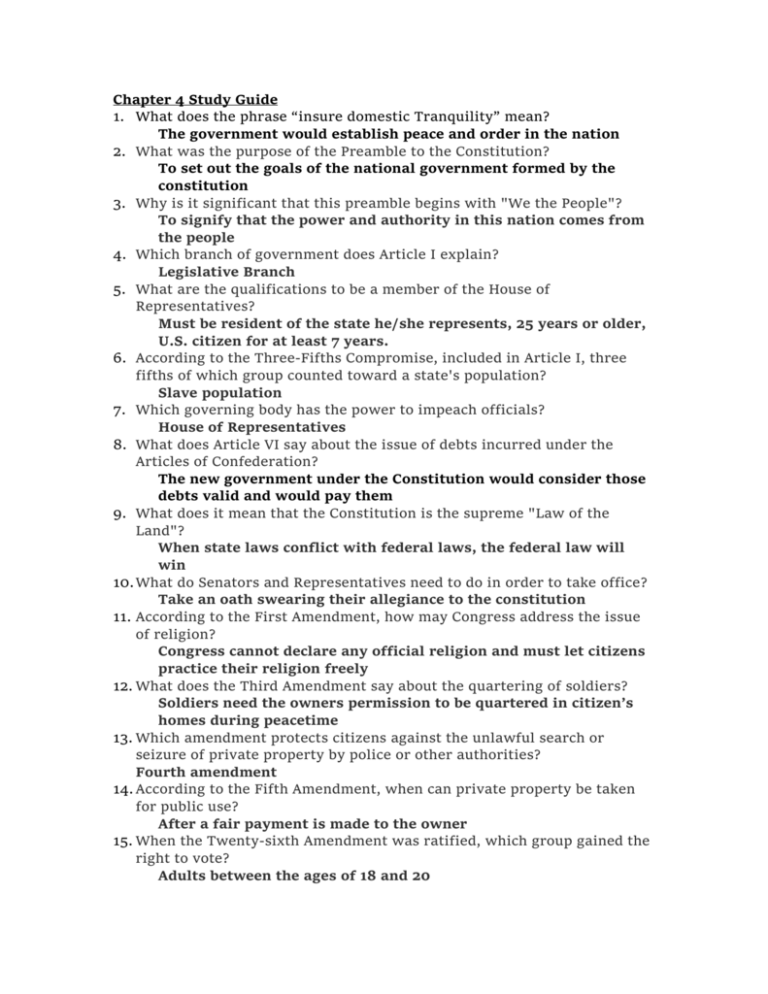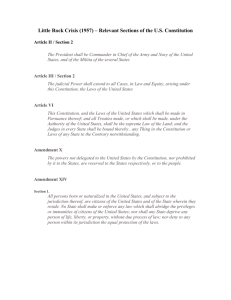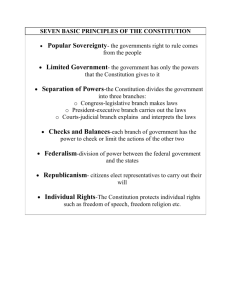files/Chapter 4 Study Guide KEY
advertisement

Chapter 4 Study Guide 1. What does the phrase “insure domestic Tranquility” mean? The government would establish peace and order in the nation 2. What was the purpose of the Preamble to the Constitution? To set out the goals of the national government formed by the constitution 3. Why is it significant that this preamble begins with "We the People"? To signify that the power and authority in this nation comes from the people 4. Which branch of government does Article I explain? Legislative Branch 5. What are the qualifications to be a member of the House of Representatives? Must be resident of the state he/she represents, 25 years or older, U.S. citizen for at least 7 years. 6. According to the Three-Fifths Compromise, included in Article I, three fifths of which group counted toward a state's population? Slave population 7. Which governing body has the power to impeach officials? House of Representatives 8. What does Article VI say about the issue of debts incurred under the Articles of Confederation? The new government under the Constitution would consider those debts valid and would pay them 9. What does it mean that the Constitution is the supreme "Law of the Land"? When state laws conflict with federal laws, the federal law will win 10. What do Senators and Representatives need to do in order to take office? Take an oath swearing their allegiance to the constitution 11. According to the First Amendment, how may Congress address the issue of religion? Congress cannot declare any official religion and must let citizens practice their religion freely 12. What does the Third Amendment say about the quartering of soldiers? Soldiers need the owners permission to be quartered in citizen’s homes during peacetime 13. Which amendment protects citizens against the unlawful search or seizure of private property by police or other authorities? Fourth amendment 14. According to the Fifth Amendment, when can private property be taken for public use? After a fair payment is made to the owner 15. When the Twenty-sixth Amendment was ratified, which group gained the right to vote? Adults between the ages of 18 and 20 16. Until the passage of the Twenty-third Amendment, which Americans could not vote in presidential elections? Residents of the District of Columbia 17. What are the six guiding principles of the Constitution? Rule of Law, Popular Sovereignty, Independent Judiciary, Separation of powers/checks and balances, Federalism 18. Which article of the Constitution defines the responsibilities of the Executive branch? Article two 19. Which guiding principle gives the power of the government to the people? Popular Sovereignty 20.This guiding principle states that no one is above the law. Rule of Law 21. What is due process of law? the principle that people accused of a crime must be granted certain legal rights 22. Why did the framers of the Constitution create three separate branches of government? To keep an one group from gaining too much power 23. The first words of the Constitution indicate that power and authority in our system of government come from who? people 24. Over time, constitutional amendments have extended which right to the following groups: African Americans , Women , Residents of the District of Columbia, 18-year-olds? The right to vote 25. The Supremacy Clause of the Constitution indicates how to resolve conflicts between what two things? State and federal laws 26. How is the process of checks and balances used in the making of treaties? Treaties suggested by the House of Representatives require the approval of the Senate 27. How did the decision in Marbury v. Madison (1803) strengthen the power of the Supreme Court? It established the Court’s right to declare an act of congress unconstitutional 28. The process of amending the Constitution involves what two groups/parties? The Congress and the States 29. How is power divided in our federal government? Between the national and state government 30. Why did the framers of the constitution write the words “We the People” so much larger than the rest of the Preamble They wanted to make clear that the power of our national government comes from the people








